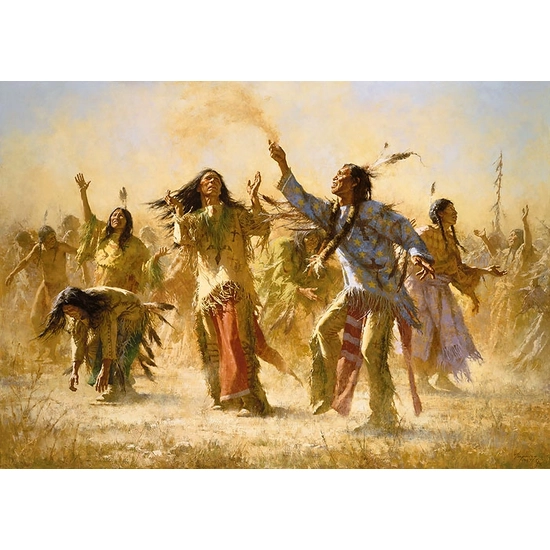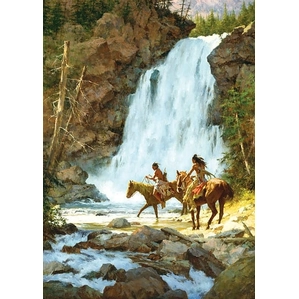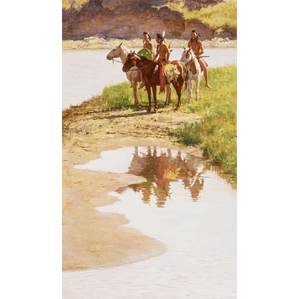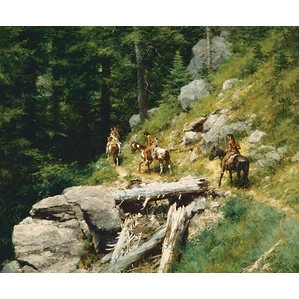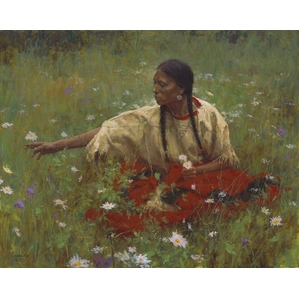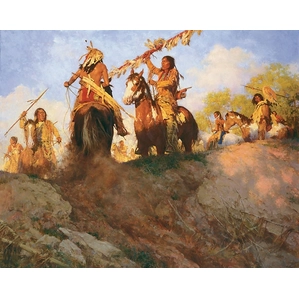Howard Terpning HOPE SPRINGS ETERNAL Giclee On Canvas Artist Proof
Status: In Stock Available | Condition: New | Edition:Artist Proof Giclee On Canvas Artist Proof | Edition Size: Artist Proof | Dim:Image Size: 56"w x 39"h | Howard Terpning| Item #: GWHOPSPE
Price: $ 3,500.00 USD..
4/21/2025 $1,166.67 1st payment
5/21/2025 $1,166.67 2nd payment
6/20/2025 $1,166.67 3rd & final payment
payments are automatically deducted from your credit card.
Howard Terpning HOPE SPRINGS ETERNAL Giclee On Canvas Artist Proof is eligible for 3 equal layaway payments in store, with a credit card of $1,166.67 made every 30 days over a period of three months. US & Canada orders only.
Within The Continental USA Only
FREE Intl Shipping.Get More Details on FREE International Shipping.
Countries We Ship To:
Countries We Ship To:
Howard Terpning is one of the most celebrated Western artists, known for his historically rich and emotionally compelling depictions of Native American life. With a deep respect for Plains Indian culture, his paintings capture narrative storytelling in art, bringing history to life through traditional oil paintings. A member of the Cowboy Artists of America, Terpning’s work is recognized for its historical realism and museum-quality craftsmanship. His fine art prints and originals are highly sought after, making him a defining figure in American West painting.
As an option you may also pay for Howard Terpning HOPE SPRINGS ETERNAL Giclee On Canvas Artist Proof using Paypal or with your Amazon Account(*select items). Please note that all orders must be delivered to a physical address verified by Paypal or Amazon.
HOPE SPRINGS ETERNAL ANNIVERSARY MUSEUM EDITION - GWHOPSPE
NOTES: HOPE SPRINGS ETERNAL ANNIVERSARY MUSEUM EDITION - The 1876 defeat of Custers 7th Cavalry at Little Big Horn proved to be a Pyrrhic one for the Sioux and the Cheyenne as well as the Plains Indian culture. From that point on, it became a priority for the U.S. government to establish unquestioned control of the West. The entire Plains Indian way of life came under attack with the intent to destroy it. Bison were no longer hunted for their hides, they were simply slaughtered. By 1881, most tribes had been hunted, harried and driven onto the harsh, unproductive lands sets aside as reservations. Confined, malnourished and stripped of their freedom and dignity, the suffocation of the Plains Indians and their culture was underway. In 1889, a Paiute medicine man, while suffering a high fever, had a vision. In it, he journeyed to the afterworld and saw that those who had died in the past were living a happy life. He was told that through dance his people could regain the old ways that had been taken from them. The dance would resurrect the dead, bring back the buffalo and cause the white man to disappear. That his vision occurred during a solar eclipse only added to its significance. The Ghost Dance swept the Plains like a wildfire and was embraced like a religion. The promise of a return to the life they had lost was a powerful intoxicant. As tribe after tribe entered the movement ― the Arapaho, Cheyenne, Shoshone, Comanche and Sioux ― the U.S. government became more and more concerned. The dancers wore loose shirts and dresses that were adorned with feathers, fringe and symbols of the moon and stars. They moved in a counter-clockwise direction to the rhythm of drums, chants and songs. Handfuls of dirt were hefted into the air to symbolize the burial of the white man. As they danced some would fall into trances where they claimed to communicate with the dead. It was believed that the Ghost Shirts and Dresses they wore would be impervious to the soldiers bullets. The Ghost Dance soon emboldened bands of Indians to leave their reservations and return to their old way of life. That was the beginning of the final end. The army hunted down those that left the reservations; leaders such as Sitting Bull were killed and finally, the violence culminated on December 29, 1890 with the massacre at Wounded Knee..
HOPE SPRINGS ETERNAL Giclee On Canvas Artist Proof by Howard Terpning
image Copyright © 2025 by Howard Terpning

Gift Card Purchase
E-Gift Cards from The Collection Shop are the perfect way to gift art enthusiasts. Click below for more details!
Howard Terpning bio
Quite simply, Howard Terpning is one of the most lauded painters of Western art. His awards are so numerous and he is honored with them so often, that to list them would require changing the count every few months. To name three would be to cite the highest prizes awarded to Western art: countless awards from the Cowboy Artists of America, the Hubbard Art Award for Excellence, the National Academy of Western Art s Prix de West and the Lifetime Achievement Award from the Gene Autry Museum. Why such praise? Passion, compassion, devotion and respect for his subject matter, extraordinary talent in palette and brushstroke, an exceptional ability to evoke emotion both in his paintings and from those viewing them — all this and more has made Terpning the "Storyteller of the Native American." Born in Illinois and educated at the Chicago Academy of Fine Arts and the American Academy of Art, he first gained attention from some powerful Time and Newsweek covers. Film fans praised his movie posters for such classics as The Sound of Music, Dr. Zhivago and the re-issue of Gone with the Wind. But his love of the West and Native American traditions saw his transition to fine art. Terpning was a long-time member of the Cowboy Artists of America, which has presented him with Gold and Silver awards, "Best of Show" awards, and "Best Overall Show by a Single Artist" awards more than two dozen times. His first book, The Art of Howard Terpning won the Wrangler "Outstanding Art Book" award from the National Cowboy Hall of Fame. Spirit of the Plains People, his second book, was released in 2001 in conjunction with a one-man show at the Eiteljorg Museum of American Indians and Western Art. A third, Tribute to the Plains People, was released in 2012 to celebrate his retrospective at The Autry National Center in Los Angeles.

